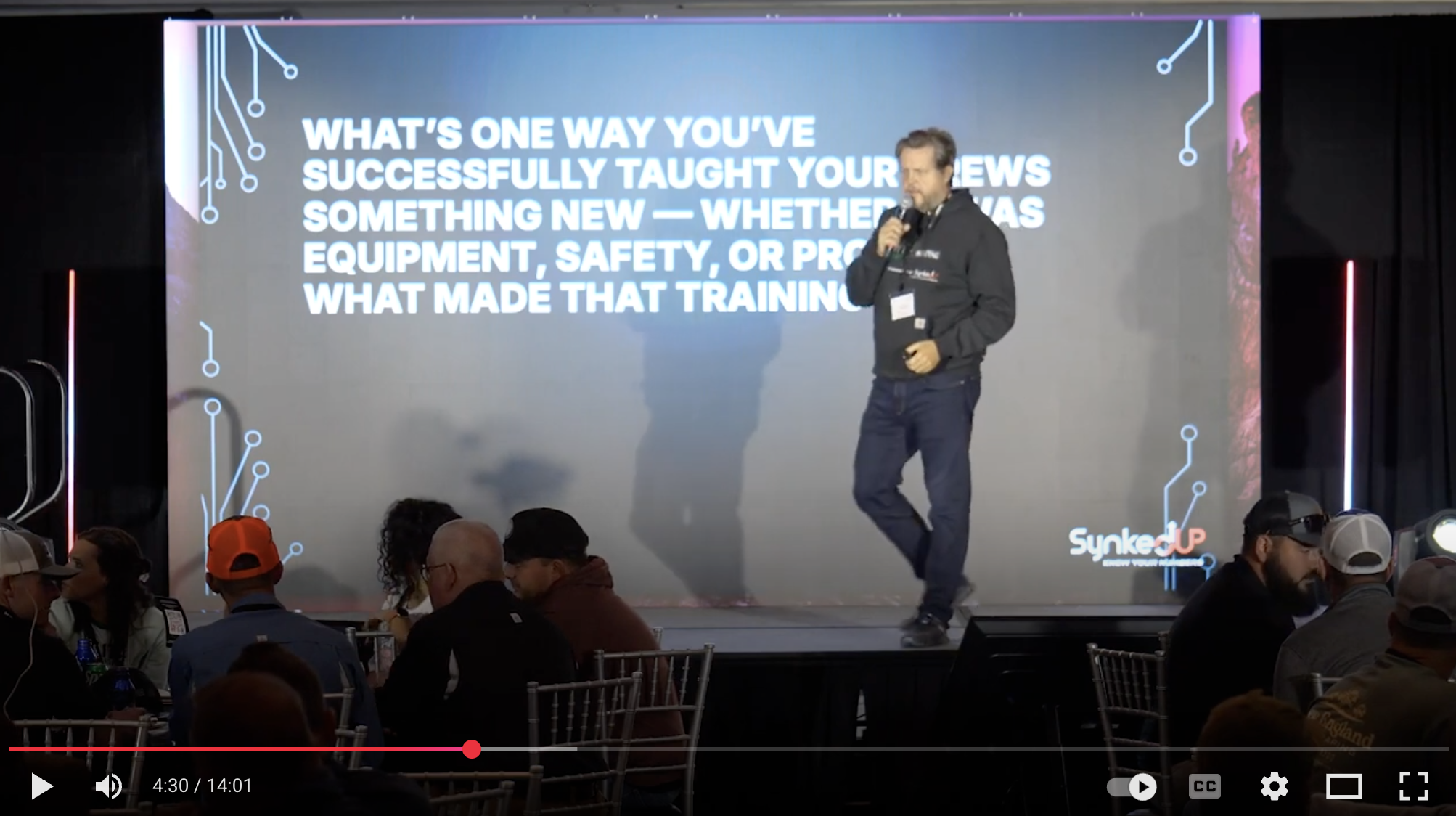What a Room Full of Landscapers Taught Me About My Own Leadership Failures

Here is the full video of my talk
In September of 2025, I stood in front of 120+ landscaper owner-operators to talk about technology adoption.
Me – the CTO who builds software for a living – teaching contractors about getting their crews to use apps.
The irony wasn't lost on me.
Halfway through my talk, as I watched these business owners share their struggles with getting teams on board, something uncomfortable happened. I realized I was describing my own failures. Different industry, same human problems.
And that's when the talk took a turn I didn't expect.
The Question That Exposed My Own Hypocrisy
I had asked them to discuss a simple question: "Think about the last time you introduced something new in your company. Did you use it first, or did you expect the crew to just run with it?"
One contractor grabbed the mic: "I had my foreman learn the mobile app. I didn't. I just assigned it to him. But then the guys weren't using it right, and I was giving them crap about it."
The room laughed. I laughed. Then I had a sinking feeling.
Two months earlier, I'd done the exact same thing with a new code assist tool. Assigned it to my senior engineers. Never touched it myself. Then wondered why adoption was spotty.
These landscapers weren't just sharing their stories. They were holding up a mirror to every leader in every industry who's ever said, "Hey team, let's try this new thing" while secretly hoping someone else would figure it out.
When Boulder-Slinging Becomes a Metaphor for Leadership
The conversation shifted when someone shared how they actually got training to stick.
"We do a lot of water features," he said. "We were having a hard time with guys figuring out how to sling boulders safely. These things weigh 1,500 pounds. One wrong move and someone dies."
The room got quiet.
"So we took a half day. Two excavators. A pile of boulders. Everyone – and I mean everyone – spent six hours just practicing. Moving boulders from one side to the other. That half day saved us the entire year."
As he spoke, I thought about all the "critical" systems I'd rolled out with a 30-minute Zoom training and a Confluence page. No wonder my adoption rates sucked.
The Three Words That Changed Everything
Standing there, I introduced them to what I call the 3M framework. But as I taught it, I realized I was teaching myself.
Model: You go first. Always.
I watched heads nod as I explained how teams watch our faces when we introduce new tools. They know if we're faking enthusiasm. They can smell our lack of conviction from across the job site – or the Slack channel.
One landscaper mentioned how his crew ignored the time-tracking app until he started logging his own hours first every morning. "They needed to see me do it before they believed it mattered."
Meanwhile, I'm thinking about the documentation system I've been "meaning to try" for three months.
Mentor: Teach it like it matters.
A contractor in the back shared his Monday morning routine: "Breakfast meeting every week. If something comes up during the week, we add it to the PowerPoint. We work through it as a team."
Real food. Real problems. Real solutions. Not another email with a link to a tutorial.
How many times had I sent my team a Loom video and called it "training"?
Mandate: Make it the standard, period.
This is where the room got uncomfortable. I asked, "What happens when a new policy or tool is treated as optional?"
Nervous laughter. Everyone knew the answer.
Then I asked the real question: "Why do we make things optional?"
A voice from the back: "We're afraid it won't work or that people won't like it."
There it was. The truth we all dress up as "flexibility" or "collaborative leadership."
The Universal Truth About Small Teams
Here's what hit me hardest: These landscaping crews of 5-15 people face the exact same challenges as my engineering team.
When teams are small, there's no bureaucracy to hide in. No middle management to buffer between leadership and execution. Every person either contributes to momentum or creates drag.
One owner put it perfectly: "With a crew this size, one guy not using the system means 20% of my workforce is off-standard."
Replace "crew" with "engineering team" and "system" with "deployment pipeline" and you have my world.
The Confession That Changed the Vibe
Near the end, I admitted something I hadn't planned to share:
"I'm the CTO of a software company, and I still feel uncomfortable every time I have to mandate something. I want to say 'Hey, we're a family, let's share ownership.' But that's not how it works. Sometimes leadership means making the call and owning it."
The room shifted. Suddenly, we weren't landscapers and a tech guy. We were just leaders trying to figure out how to get people to follow without feeling like dictators.
What Landscapers Taught a CTO
As I packed up my laptop, contractors came up to share more stories. Each one was a mirror to my own leadership struggles:
- The owner who finally admitted he'd never logged into the system he bought for $50K
- The foreman who started using the app religiously and watched his crew follow within a week
- The company that made app usage tied to payroll and saw 100% adoption overnight
Driving home, I made a list of every "optional" system in my engineering org. The list was embarrassingly long.
Your Truth Moment
Here's what those landscapers taught me: The gap between "good idea" and "standard practice" isn't bridged by better tools or more training.
It's bridged by leaders who have the courage to go first, teach what they've learned, and make the hard call that this is how we do things now.
Whether you're managing crews with excavators or engineers with keyboards, the challenge is the same:
Will you Model it, Mentor it, and Mandate it?
Or will you keep pretending that "optional" is a kindness instead of cowardice?
Because your team – whether they're slinging boulders or shipping code – deserves clarity, not choices.
They deserve a leader who's done the work.
Even if it takes six hours of practice to get it right.
That talk to landscapers became a mirror to my own leadership. What industry outside your own has taught you something unexpected about your work? I'm collecting stories of cross-industry insights. Reply and share yours.
